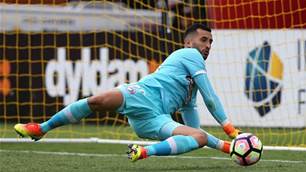Media expert Peter Cox says the A-League is entering a "danger period" with a number of factors combining to cause declining attendances and TV viewership.
This season, according to reports, ratings on free-to-air are down 21% and on pay TV have dropped 16% compared with the 2016/2017 campaign.
Crowd figures have declined 12% across the competition, compared year-on-year, with the recent Melbourne derby only attracting 20,787 fans.
Analyst Cox believes there is a number of reasons why the A-League has dropped off in attendances, ratings and general interest, compared with previous years.
He told FourFourTwo that a lack of marquee players, the Socceroos' protracted qualifcation for the 2018 World Cup and the civil war over the FFA congress, along with market forces, have combined to cause a general problem.
"There hasn’t been a driver for it," Cox said.
"I think you’ve got the market situation, and then you’ve got the particular problem with sport. There’s the stoush between the FFA and the clubs has not been a good look for soccer in Australia.
"The fact that our national team struggled so much in the qualifying rounds was another factor. We all understood we should have not had to play extra matches, not have the Honduras situation etc. I think all of these have been negatives on the game.
"You take Sydney FC for example, easily the most successful club in Australia, and it’s not drawing people. If your most successful club in the country can’t fill their ground, can’t attract a premium TV audience, then you’ve really got a problem.
"The only time Sydney FC draws a big crowd is when they have the local derby with the Wanderers. I think all of those are indicators that there’s a move away.
"The exception to that has been the Matildas. They’ve done very well, but of course coming from a low base. There’s been an excitement in that competition, Sam Kerr has brought a lot of excitement.
Welcome to mad world of Aussie soccer. Fox pays big $$ for #ALEAGUE rights. Castro on marquee deal to promote game. Castro has learnt good English but won't speak to Fox after man of match. A-League gets smashed in ratings by women's cricket. Most watching #BBL anyway. #BRIvPER
— Braden Quartermaine (@bquartermaine) December 21, 2017
"When the confluence of the factors come together… The interest in sport is changing and when it comes together with something going wrong, like the Australian team, and you combine that with the league not being particularly exciting this year.
"When you put all those three together you are facing a danger period. I think this is a danger period for soccer and they don’t want it to slip back at this time. It’s not only with soccer but with the other sports as well."
The Melbourne derby was watched by only 77,000 people on Fox Sports, while the Women's Big Bash League has pulled in strong numbers against the A-League.
This season the competition has been hit by constant criticism of the VAR and traditional contenders Melbourne Victory and Brisbane Roar have struggled.
Cox points to participation trends that show an overall move away from all team sports, not only in football.
"It's catching up to soccer now as well," he said.
"There has been a movement in society away from those competitive sports towards individualised sports. If you say the participants reflect the viewing and the interest of a sport, you can see there is a significant market change happening.
"Last year in rugby league the TV numbers were down, the crowds were down, the shots of the empty stands behind the players looked terrible. And it looks terrible in soccer as well.
"Young people have other interests these days. The world has changed. It’s a societal, culture change that is the major threat to these sports.
"Sponsorship is [also] now struggling in sport. A lot of that support for sport in the past was driven by executives themselves who wanted to go to the sport, sit at the front in the corporate box, meet important people and do all those things.
"Now chief executives want a return on their marketing dollars and a lot of that expenditure is harder to substantiate."
Market trends around the world, in the NFL in America and the Premier League in the UK, show declining TV ratings.
Cox believes in Australia the days of media companies shelling out massive broadcast deals to sporting bodies could be over soon.
"If the sports think they’re going to have huge amounts of money paid to them in the future for sport by television... the traditional media owners in Australia aren’t going to want to pay those sorts of prices," he said.
"They not only aren’t going to want increases, they’re going to want decreases. Sport is under challenge. And the minority sports are going to find it the hardest."
Related Articles

Socceroo-in-waiting seals Championship deal

Fringe Socceroo swerves A-League to remain in Europe after Fulham exit













